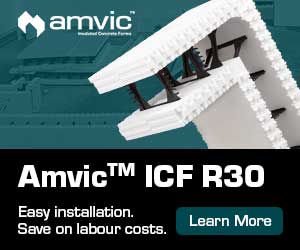By Tom Patton
There are a lot of questions on the ICF chat pages as to which is the best ICF and how to pick one to make your investment in building either a residential or commercial project. This magazine has over the years presented numerous articles on various ICFs and how to select the right one for your project. Naturally, ICF-experienced installers have their own favorites based on the efficiency in using the product, availability, and support. If you are seeking advice, get it from experienced contractors who have over time built with several different ICF products and have settled on one that suits their needs and abilities.
The ICF Landscape
In the ICF industry, the major manufacturers (ICFMA members) have all developed products to the latest standards and manufacturing specifications. The first step in looking at any product is to review the Compliance Code Research Report, ensuring the product meets the building code standards. If you are following a “word of mouth” recommendation, it is advised to do your own due diligence on the contractor and the product. In researching the products to find the one you want, an experienced ICF contractor should be able to install it or provide further advice on the pros and cons. When in doubt, talk to the manufacturer’s sales reps or the local distributor. Explore the support network on the product.
Accessing Product Information
In the initial research the access to product information and support is a key element. Product availability and support during the build are very important elements to have. The local distributor, sales representative, or experienced contractor should develop your confidence in picking a product and the overall process.
Importance of Training
ICF manufacturers have educational classes for installers. It is very important that any contractor and crew understand the installation techniques for the ICF block, structural applications, building science attributes, plus material and time estimates. The shortage in the trade labor pool has created a loss in available trained workers. As a contractor, if you and your crew are trained installers, promote that. If you are selecting a contractor or installer, ask for verification of ICF training. Being trained as an ICF installer provides the knowledge and hands-on experience to lay the blocks to exact dimension, understand the placement of reinforcement bars, and concrete, plus how to eliminate voids, building walls straight and plumb.
ICFs vs. Traditional Construction Costs
The next most asked question is about cost. Doing a comparison of an ICF wall assembly to a typical wood-framing wall estimate is more complicated than just the numbers. ICF walls are high-performance walls that as one product include many applications — structure, thermal, continuous double layers of insulation, air tightness and vapor retardant, strapping, etc. Any comparison to a wood-framed wall must be to a high-performance assembly level that includes all these materials, applications, and attributes — apples to apples.
Another cost consideration on ICF material is for shipping. Some ICF distributors stock materials which provide close access and lower shipping costs to the jobsite. Other ICFs may be shipped directly from the manufacturing plant to the jobsite. Where the ICF plant is located dictates the freight charges. Major ICF manufacturers have numerous plants across the country which may be an advantage for a better freight charge. So, it is not just the block cost but the freight charge to the jobsite that needs to be considered. Another consideration is what happens, if, during the build, the project comes up short a few blocks.
As a side note on costs, building materials prices are fluctuating, and now with tariffs on some materials, plus increases in manufacturing costs, there is an expectation that the market value of all ICF blocks may possibly change in the future months.
Speed and Efficiency Advantages
The advantage of selecting ICFs is the compression of the build schedule, resulting in faster occupancy. This acceleration improves scheduling and coordination, reduces construction costs, risk insurance, and overall labor costs. Faster builds mean faster financial draws and reduced construction loan fees. ICFs have a proven record for faster completion and occupancy. There are real savings up front and over the long run by building and living in an ICF building.
Switching to ICFs
Depending on the project, be it a simple foundation, crawl space, stem wall, single multistory residential, or tall wall commercial, ICFs are an ideal building material for all applications, big or small. There are advantages to using ICFs for any project or building type. Check out the award winners and case studies on the website of this magazine, icfmag.com.
Taking the step from traditional construction methods of wood framing or CMU wall assemblies into planning and using ICFs may feel like a major move with a lot of new challenges. This is not the case. ICFs are a recognized, established building material and construction system. Manufacturers have extensive websites, documentation, and educational materials to guide anyone along. Follow the advice of the product manufacturer. Chat pages are handy for some things but trusting some of the recommendations on product selection may not be in your best interest. Do the research, and talk to a sales rep, or the product distributor. It’s like helping a baby take the first step — someone you trust should be or could be holding your hand.

Tom Patton
Tom Patton had a 30-year architectural design background prior to joining the ICF industry in 2001 with the technical support department at ARXX. Over the last 20 years, Tom has worked with major ICF companies developing technical documentation, application details, and training programs, as well as consulting and promoting ICFs with various associations including the ICFMA, NRMCA, and codes and standards committees. Currently, Tom is Corporate Brand Ambassador for Fox Blocks and co-developer of the Fox Blocks Integrated Learning Center.








